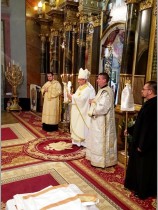Dear Colleagues and Friends,
A warm welcome to this Advent 2017 edition of the ‘The Vine’. As always, thank you for your commitment to Catholic education and the witness of Christ you provide daily to children, parents/carers and to colleagues being a ‘light in the darkness’. Advent begins with the clarion Gospel call to “stay awake” and “stand ready” to meet Jesus Christ. Catholic education, sharing in the universal mission of the Church has, from its beginnings, always lived, not only in the radiant light of Christ’s first coming, but in His coming to us now in the Sacraments, above all in the Holy Eucharist, and in the sure hope of His glorious return at the end of time (cf. Lumen Gentium n.48). This is the context in which we have met the challenges of history and have always looked confidently to the future whatever the opportunities and difficulties are of the educational landscape.
Following my election in June 2017 as the President for the next two years, I would like to stress that I will endeavour to continue to support and encourage all Catholic teachers who work in Catholic schools and college s but also those colleagues who are Catholic teachers working in community schools or other settings. CATSC is here to represent and support you all.
Working with the Executive I will ensure, that we as an organisation, continue to provide the Vine Newsletter and will present articles to the Networking Journal that you will find enriching to both your teaching and in your own personal Faith Journey. The editors of the Vine and Networking kindly request articles from all schools and members that celebrate our rich, vibrant and living Catholic faith in 2017. Members of the Executive Council will represent you at meetings with teachers from other countries especially at meetings of WUCT (World Union of Catholic Teachers) and within our own country in sharing both their expertise and enthusiasm.
The new Handbook arrived in schools and colleges at the end of October so you can see who all these enthusiastic people are. If you can’t locate the Handbook in your school, a digital version is available on the CATSC website: http://www.catsc.org/handbook.html. Please also feel free to Twitter your comments and ideas and use the CATSC Facebook pages.
The Association website has been updated and we would ask you to use both our Twitter and Facebook accounts to share your ideas, experiences and teaching resources. We will then incorporate your pieces on the website for others to use and so extend good practice across England and Wales. Please use the CATSC Dailies in your schools and classrooms and Tweet how you are using them in your setting.
In 2018 we will be holding one conference on the 2nd to the 3rd March at the Crowne Plaza, Chester. I am delighted to announce that the principal speaker is Jonathan Doyle, an internationally renowned and inspirational educator and speaker from Australia. The Conference is for colleagues working in all sectors and phases and I wholeheartedly recommend it to you all. The theme is ‘Casting our nets into the deep as Catholic Educators’.
Would those members who are Head Teachers please remember our NQTs, RQTs, Middle Leaders, Support Staff and Governors as well as SLT members when allocating places on the Conference as they also deserve the opportunity to refresh and deepen their vocations. Bookings are now open and can be placed online at: http://www.catsc.org/catsc-conference-2018.html
Finally, Advent is a special time of grace for us all to recognise the mission entrusted to us in the light of the Saviour born for us; the Saviour who is so close to us in the Holy Eucharist; the Saviour who will finally return in glory. Throughout the new liturgical year, I pray that we may all be renewed in our mission! Thank you for the generosity of living your vocations as Catholic educators and I hope CATSC will continue to provide support a nd encouragement in your work.
Wishing you the great joy of Advent and Christmas ~ John Nish, National President

























